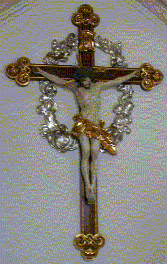Posted on April 19, 2002
Christians Need Not Apply
Stanford's exclusive "diversity"
by
Daniel Clark
Perhaps you've heard of the controversy that's been swirling around Ron Brown. No, not that one. This Ron Brown is the wide receivers coach of the Nebraska Cornhuskers, who was a recent candidate for the head coaching job at Stanford University.

The fact that Brown was not chosen for the job isn't surprising. A major program like Stanford would typically be looking for somebody who already had head coaching experience, or at least somebody who'd been an offensive or defensive coordinator, so that his abilities as a tactician would have been tested. The man who was selected, Buddy Teevens, had previously been head coach at Maine, Dartmouth and most recently Tulane, where he'd recruited superstar quarterback Shaun King.
For that reason, Coach Brown was fully prepared to take the setback in stride, if only the school had let him. "I wasn't upset with (Stanford's) decision to choose another candidate over me," he told the Daily Nebraskan, apparently the only newspaper in America that considers this a legitimate story. "But I was shocked at the reason, and that the university was that up-front in telling me the reason."
The reason Brown was given is that he is an outspoken Christian. Naturally, the folks in Palo Alto, California figured that this would make him a bad influence on the kids.
By now, your natural cynical instincts are probably kicking in. Everybody's a victim, right? Whenever somebody doesn't get what he wants, it's always due to some form of discrimination. So Brown's a Christian, and he wasn't chosen for the job, therefore the decision must be the result of anti-Christian bigotry. How convenient.
What makes this situation different, however, is that it was not Brown who first drew this conclusion, but the Stanford athletic department. The coach wrote in a recent magazine article that athletic director Ted Leland decided against bringing him back for a follow-up interview, "with the explanation that he did not believe that my Christian convictions would mesh well with that university."
Brown's religious beliefs were "definitely something that had to be considered," according to assistant A.D. Alan Glenn. "We're a very diverse community with a diverse alumni. Anything that would stand out that much is something that has to be looked at."
Get it? Coach Brown was unacceptable because he wouldn't assimilate into Stanford's "diverse community." This explanation borders on self-parody. If you're different from liberals, your presence among them conflicts with "diversity."
When Glenn uses the word "diverse" here, he really means it as an approximate synonym for "gay." Once that is understood, it is easy to see how Brown might ruffle the "diverse community," since he has publicly stated his belief that homosexuality is a sin. Granted, that probably is an unpopular opinion on the campus of Stanford, but since when does that make it "something that has to be looked at" when hiring a football coach?
It would be another story if he had said that he wouldn't allow any homosexuals to play on his team. But let's be realistic. The least biased estimates say that about 3.5 percent of all people are gay. A college football team carries about one hundred players on its roster. Ron Brown has been coaching for over twenty years. Surely he realizes that he has coached gay players, but there are not known to have been any controversies. It may be typical of college administrators to perceive mainstream religious beliefs as a threat, but where's the proof?
Brown even said, when he voiced his opinion about gays in 1999, that "the church must not do anything to ostracize these people." One might think that the diversity police would recognize this as "tolerance." But then, if they really valued tolerance, they'd have exercised it themselves.

Ron Brown's beliefs were a matter of public record for over two years before he was interviewed. He'd announced them on his own Christian radio show. If he was going to offend Stanford's fashionable agnosticism, they surely had already known it, so why waste everybody's time by pretending he had a chance to get the job?
Oh, the tangled web of diversity. As it happens, this offensively Christian coach is a black man. Stanford was not genuinely interested in him, but instead favored Coach Teevens, who is white. By interviewing a black candidate who was not "diverse" enough to be acceptable, the school made a demonstration of reaching out to minorities, while at the same time making it a liberally acceptable decision to hire the white man anyway.
But wait a minute. Doesn't that make this just the kind of dead-end token interview that the Black Coaches' Association has been complaining about? Not content with athletic directors merely going through the motions of "considering" black candidates, the BCA demands that more be hired. The organization cites the statistic that only 5 of 117 Division I-A football coaches are black as evidence of racism, while declining to say specifically which schools discriminate, or which white coaches didn't deserve to be hired.
The BCA circulates a list of promising black coaches that it would like to see hired, and Nebraska's Ron Brown is on that list. Okay, so his qualifications aren't as impressive as those of Buddy Teevens, but since when does that matter to racial bean-counters like the BCA? A black candidate was considered for a head coaching job, and the reason for his rejection is completely illegitimate. Where's the press release from the BCA condemning Stanford's decision? Come to think of it, where's the NAACP? Where's the "Reverend" Jesse Jackson and his Rainbow/PUSH coalition? Where's Kellen Winslow?
Ironically, the administrators at Stanford have immunized themselves against criticism from these people, by the very fact that they have been so forthright about their anti-Christian prejudice. Brown seemed to acknowledge this when he remarked, "If I'd been discriminated against for being black, they would've never told me that. They had no problem telling me it was because of my Christian beliefs. That's amazing to me."
If they had seriously given Brown any consideration, but honestly decided that Teevens was better suited to their needs, then a racist motive might have been inferred. Their objection to Brown's religious beliefs provides them a believable excuse. They couldn't hire a devout Christian, because the gay student organizations would be upset. That's easily understandable to anyone who specializes in group identity politics.

There's more to this story than gay activism, though. The Christian religion isn't the only one that teaches that homosexuality is a sin; Judaism and Islam do too. But can you imagine Stanford refusing to hire a football coach because he's too Jewish or too Islamic?
It's relatively easy for American college liberals to tolerate those other religions, because of their limited influence on this country's social standards. It's Christians who are recognized as the dreaded judgmental nemeses of moral relativists who populate places like Stanford. The conflict is so ingrained that it's not realistic to attribute the Brown incident to a conscious disagreement over a single issue, like homosexuality. Stanford's reaction is more reflexive than that. To left-wing intellectuals, the idea of hiring a Christian radio show host -- from Nebraska, no less -- to serve as a role model to dozens of impressionable young men is repellant. They'd sooner eat their sushi with barbecue sauce.
So acute are the liberal sensitivities at Stanford University that the school changed its team nickname from the Indians in the early seventies, decades before such concerns became trendy. Curiously, they are now known as the Cardinal, which has obvious religious connotations. Somebody must have missed a memo.
The Shinbone: The Frontier of the Free Press
Mailbag . Issue Index . Politimals